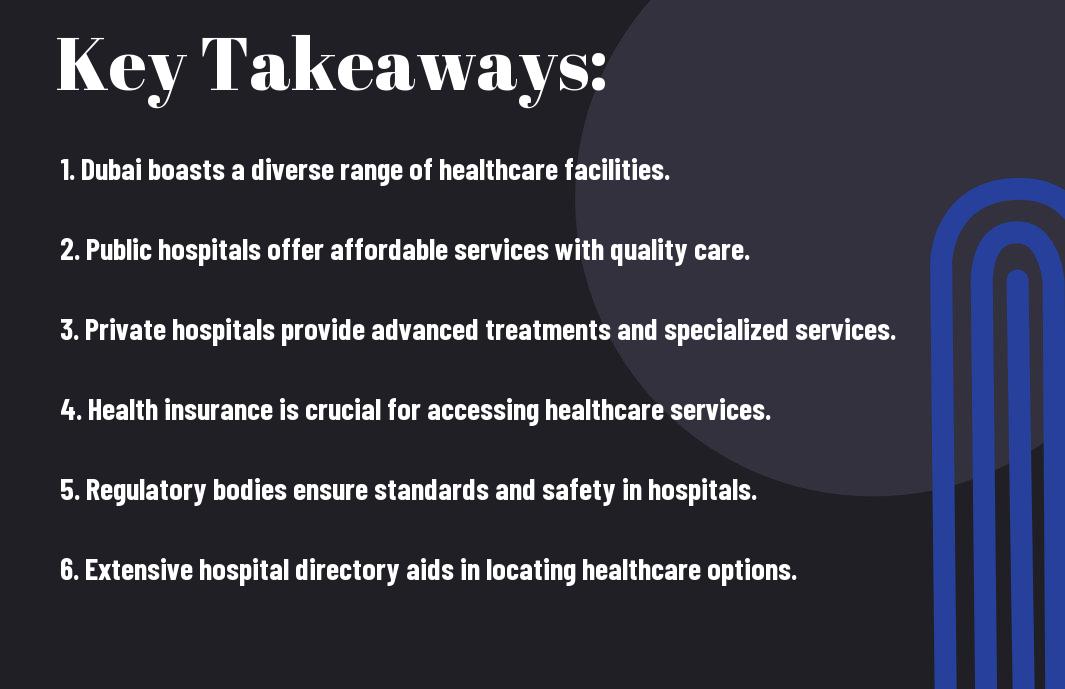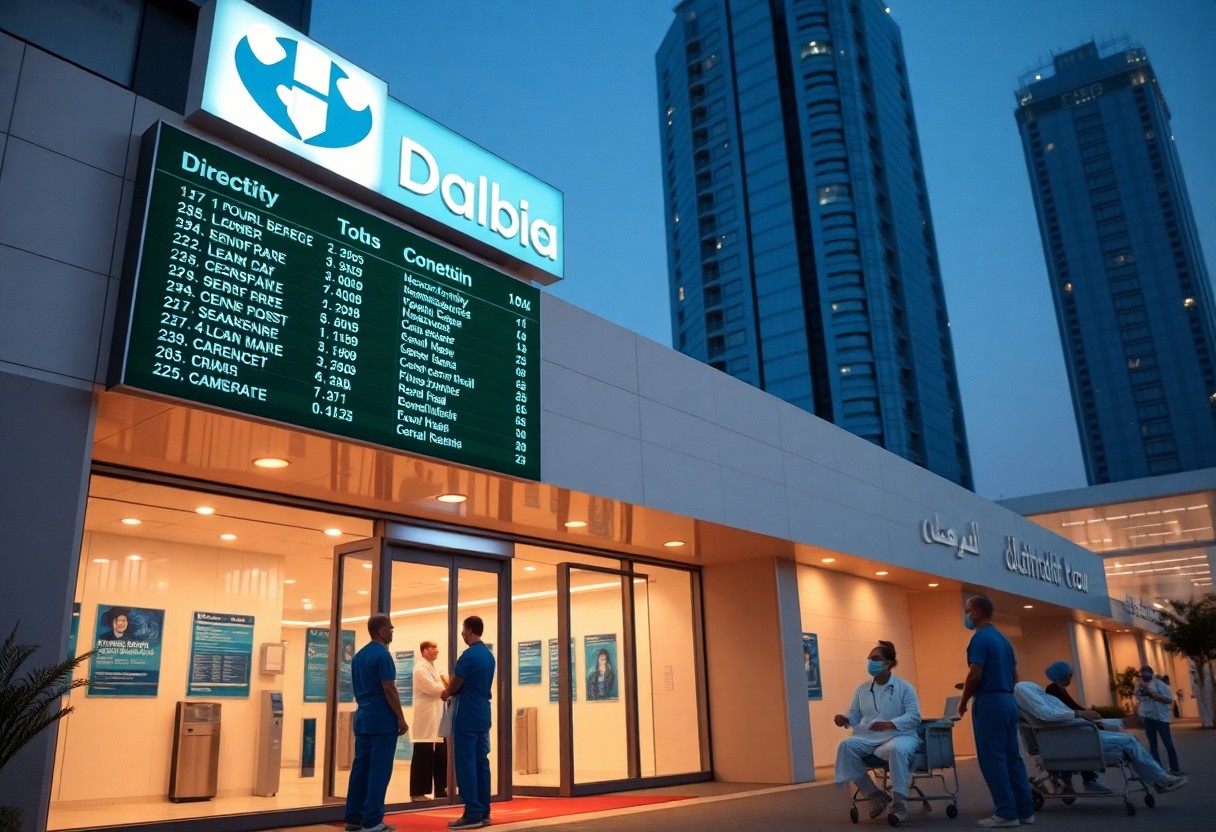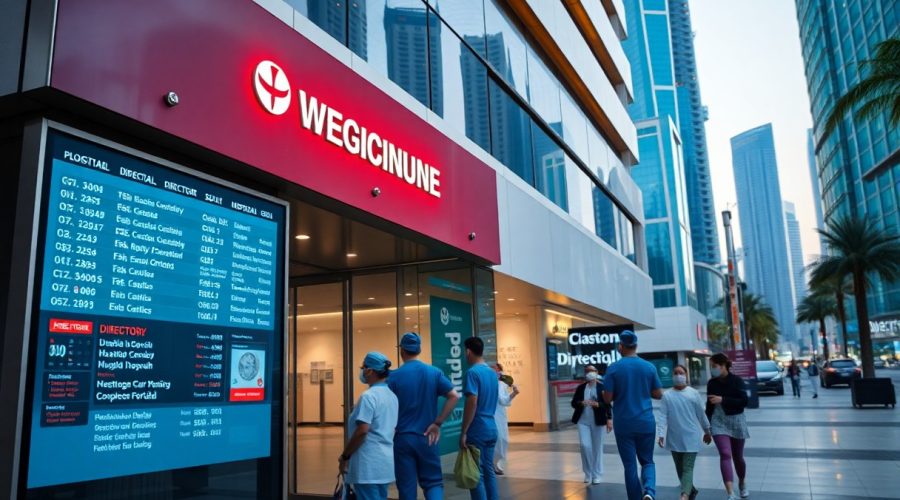Understanding Healthcare In Dubai – An In-Depth Look At The Hospital Directory
Over the past few years, Dubai has emerged as a global healthcare hub, offering a rich variety of services and facilities to meet your medical needs. In this informative blog post, you will explore the highly comprehensive hospital directory that outlines everything from state-of-the-art hospitals to specialized clinics. Understanding how to navigate this directory will empower you to make informed healthcare decisions and ensure you receive the best possible care in this remarkable city.
Key Takeaways:
- Diverse Healthcare System: Dubai offers a blend of public and private healthcare facilities, catering to various needs and preferences.
- Hospital Directory: The hospital directory provides comprehensive information on medical institutions, including specialties, services, and accreditation.
- Quality of Care: Healthcare facilities in Dubai are known for high standards, many adhering to international healthcare accreditation protocols.
- Accessibility: With a range of hospitals and clinics available, patients can easily access healthcare services throughout the city.
- Patient Rights: Understanding patient rights and the facilities available ensures better decision-making when choosing healthcare options.

Overview of Healthcare System in Dubai
To navigate the vibrant healthcare landscape of Dubai, it’s vital to understand its comprehensive system comprising both public and private sectors. The UAE government prioritizes high-quality medical services, making substantial investments in healthcare infrastructure to ensure citizens and residents have access to state-of-the-art facilities and expert care.
Structure of Healthcare Services
Beside a robust public healthcare sector, Dubai boasts a well-developed private healthcare system that caters to different needs and preferences. You will find an array of hospitals, clinics, and specialized medical facilities offering advanced treatment options and personalized care.
Regulations and Standards
Overview of the regulatory framework governing healthcare in Dubai highlights the commitment to safety and excellence. The Dubai Health Authority (DHA) enforces strict policies to maintain high standards of patient care, ensuring all medical practitioners and facilities adhere to best practices.
At the core of Dubai’s healthcare regulations are initiatives that aim to protect patients and promote health. The licensing system for healthcare professionals, combined with regular assessments of medical facilities, facilitates a safe environment for your health needs. You can feel confident knowing that internationally recognized standards are established to ensure that all aspects of care are monitored and evaluated continually.

Types of Hospitals
One of the most crucial aspects of understanding healthcare in Dubai lies in recognizing the various types of hospitals. These institutions can be categorized based on their ownership, services offered, and target demographics. Below is a breakdown:
| Type | Description |
| Public Hospitals | Government-funded facilities providing crucial services. |
| Private Hospitals | Independently operated hospitals with varied services. |
| Specialized Hospitals | Focus on specific medical fields or conditions. |
| Teaching Hospitals | Affiliated with universities for education and training. |
| Urgent Care Centers | Address non-life-threatening emergencies promptly. |
After you familiarize yourself with these types, you can make informed decisions about where to seek healthcare.
Public Hospitals
Public hospitals in Dubai are mainly funded by the government, ensuring that healthcare remains accessible to the general population. They provide comprehensive medical services, including emergency care, that cater to a wide range of patients, often at lower costs. These hospitals maintain a high standard of care, supported by a dedicated workforce.
Private Hospitals
Private hospitals offer tailored healthcare services, often featuring advanced technology and specialized teams.
Also, these facilities tend to provide quicker access to services, reducing waiting times significantly. They often boast more comfortable environments and a focus on patient-centered care. However, it is important to note that costs may be higher, and you should always review your insurance coverage before seeking treatment. In emergencies, choosing a private hospital can be beneficial, but evaluating quality versus cost is crucial for satisfactory healthcare experiences.
Specialty Medical Services
Not only does Dubai offer a comprehensive healthcare network, but it also features a variety of Healthcare System in UAE: Services and Facilities tailored to meet specialized needs. From advanced cardiac care to cutting-edge cancer treatment, you can find hospitals equipped with state-of-the-art technology to handle a spectrum of medical issues. These specialty services ensure that you receive personalized care aimed at your specific health concerns.
Emergency Care
For immediate medical needs, Dubai’s emergency care facilities are available around the clock, providing quick access to necessary services. Equipped with modern technology and staffed by qualified professionals, these centers ensure that you receive timely, life-saving interventions when every second counts.
Specialized Clinics
Among the various healthcare options in Dubai, specialized clinics stand out for their focused treatment plans tailored to specific medical conditions. These clinics often offer services in areas like dermatology, orthopedics, and reproductive health, providing you with expertise and dedicated attention.
Specialty clinics offer an array of benefits, such as enhanced expertise in distinct medical fields, which can be imperative for effective treatment. Patients at these facilities often experience shorter wait times and personalized care plans. Furthermore, clinics focusing on areas like orthopedics or cardiology may provide the latest in technology and treatment protocols, ensuring you receive the best possible outcomes tailored to your specific health needs.
Accessing Healthcare
All residents and visitors in Dubai have access to a modern healthcare system that is well-equipped to handle various medical needs. The healthcare landscape here includes public and private hospitals, clinics, and specialized medical facilities that offer a wide range of services, ensuring you have options no matter what your health requirements may be.
Health Insurance in Dubai
Across Dubai, health insurance is mandatory for residents, with numerous plans available to suit different budgets and healthcare needs. It’s imperative to choose a policy that provides adequate coverage for both routine and emergency care. Many employers also offer health insurance benefits, ensuring a broad network of services for you to select from.
Booking Appointments
Dubai’s healthcare system makes booking appointments accessible and straightforward, allowing you to schedule visits easily. Most hospitals and clinics offer online booking options and mobile apps to facilitate this process. You can also call directly or visit in person to arrange your appointments.
This user-friendly approach means that you can quickly secure medical visits when needed. Many healthcare facilities offer 24/7 online booking, which provides convenience and flexibility for your busy lifestyle. Additionally, reminders via email or SMS help keep you informed about your appointments. However, it’s important to check the availability of specialists you may require, as some can get booked up quickly. Overall, being proactive about your healthcare appointments in Dubai ensures you receive timely and effective medical attention.
Quality of Care
After considering various factors, the quality of care in Dubai’s healthcare system is outstanding, with hospitals and clinics striving to meet the highest standards. The emphasis on advanced technology, skilled professionals, and patient-centered practices contributes to safe and effective healthcare services. As you navigate through the healthcare system, knowing the indicators of quality will enhance your confidence in the treatment you receive.
Patient Satisfaction
Quality of care is often reflected in patient satisfaction, which is measured through surveys and feedback mechanisms in hospitals. High levels of patient satisfaction indicate that healthcare providers are successfully meeting the needs of their patients, including aspects like communication, accessibility, and comfort. As you seek medical services, take time to consider patient reviews and ratings to gauge the overall satisfaction levels of previous patients.
Accreditation of Healthcare Facilities
Quality in healthcare facilities is significantly influenced by accreditation, which signifies that hospitals meet established standards of care. Accredited institutions undergo rigorous evaluations and inspections that ensure they maintain high-quality services, patient safety, and effective outcomes. This accreditation process assures you that the facilities you choose to seek treatment from prioritize excellence in their operations.
In addition to the importance of accreditation, understanding what it entails can further enhance your trust in the healthcare services you pursue. Accredited facilities must comply with strict guidelines set by recognized organizations, which cover patient safety protocols, staff qualifications, and the implementation of best practices in treatment. This level of scrutiny serves to protect you as a patient, ensuring you receive care from institutions that consistently deliver appropriate, safe, and effective treatments. Engaging with accredited facilities not only enhances your healthcare experience but also improves the overall quality of care delivered within Dubai’s evolving healthcare landscape.
Healthcare Innovations
Many healthcare innovations are transforming the way medical services are delivered in Dubai. The integration of advanced technologies is enhancing patient care, improving diagnostics, and streamlining hospital operations. You will find that the ongoing developments in healthcare innovations not only boost efficiency but also elevate the overall patient experience, ensuring that you receive the best possible care.
Technology in Healthcare
After years of rapid advancements, technology in healthcare has become a cornerstone of modern medical practices. You can expect a wide array of technologies, such as electronic health records, AI-driven diagnostics, and wearable health devices, to play a significant role in your healthcare journey. These innovations facilitate better communication between healthcare providers and patients, ensuring you receive timely treatments and personalized care.
Telemedicine Services
One of the standout innovations in Dubai’s healthcare system is telemedicine services. This approach allows you to consult qualified medical professionals from the comfort of your home using your smartphone or computer. Telemedicine not only saves you time and effort but also provides access to specialists who may be located far away. As a patient, you can benefit from reduced waiting times, on-demand consultations, and tailored healthcare advice, all while maintaining necessary physical distancing, which can be vital during health crises.
Telemedicine is rapidly evolving, providing you with an opportunity to connect with healthcare providers like never before. With video consultations, remote monitoring, and e-prescriptions, your healthcare can now be more accessible and efficient. However, it is necessary to ensure that you choose reputable telemedicine platforms that prioritize privacy and security of your medical information. By embracing telemedicine, you gain flexibility and can better manage your healthcare needs in a way that fits your lifestyle.
Conclusion
Ultimately, gaining a thorough understanding of healthcare in Dubai, especially through its comprehensive hospital directory, equips you with the necessary knowledge to make informed decisions about your health and well-being. By familiarizing yourself with available medical facilities, services, and specialties, you can effectively navigate the healthcare landscape, ensuring you receive the best possible care tailored to your needs. Whether you are a resident or a visitor, your awareness of these resources will empower you to seek the right support when needed.
FAQ
Q: What types of healthcare facilities are available in Dubai?
A: Dubai offers a diverse range of healthcare facilities, including public hospitals, private hospitals, specialized medical centers, clinics, and pharmacies. Public hospitals, such as Rashid Hospital and Dubai Hospital, provide imperative services at lower costs but may have longer waiting times. Private hospitals, like Mediclinic and Emirates Hospital, generally offer faster services and more privacy, but at a higher cost. Specialized medical centers focus on specific areas of healthcare, such as pediatrics, orthopedics, or cosmetic surgery.
Q: How does health insurance work in Dubai?
A: In Dubai, health insurance is mandatory for all residents, including expatriates and Emiratis. Employers are required to provide health insurance for their employees. Health insurance plans vary widely in coverage, with some policies covering only basic services and others offering comprehensive coverage that includes preventive care, specialist consultations, and outpatient treatments. It is imperative to review the policy details to understand co-pays, exclusions, and the network of hospitals and clinics associated with the plan.
Q: What should I consider when choosing a hospital in Dubai?
A: When choosing a hospital in Dubai, consider factors such as the hospital’s accreditation, the range of services offered, the availability of specialists, patient reviews, and the hospital’s location. It is also advisable to check if the hospital is part of your health insurance network to avoid unexpected expenses. Furthermore, consider speaking to friends or family who have used the services of the hospital to get personal recommendations.
Q: Are there any specific health regulations in Dubai that I should be aware of?
A: Yes, Dubai has specific health regulations that aim to ensure the quality of care and safety for patients. All healthcare providers must be licensed by the Dubai Health Authority (DHA), and hospitals are routinely inspected for compliance. Additionally, certain vaccinations and health clearances may be required for residents, especially expatriates. It is imperative to stay updated on these regulations, particularly for expatriates moving to Dubai for work.
Q: What role does telemedicine play in Dubai’s healthcare system?
A: Telemedicine has gained significant traction in Dubai’s healthcare sector, especially following the global pandemic. Many hospitals and clinics now offer telehealth services for consultations, follow-up visits, and mental health support. This service is particularly beneficial for patients with mobility issues or those seeking immediate care without the need for an in-person visit. Patients can consult licensed practitioners through secure video calls or messaging platforms, providing a convenient option for healthcare access.



